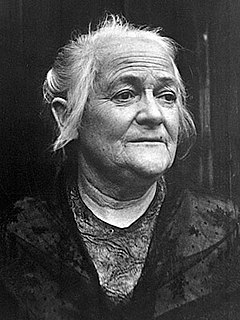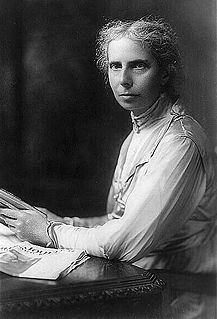A Quote by John Bright
I hope this view of the question may be a mistaken one, because it does not seem to me very unlikely that the suffrage will be granted to women.
Related Quotes
Two questions help us see why we are unlikely to get what we want by using punishment... The first question is: What do I want this person to do that's different from what he or she is currently doing? If we ask only this first question, punishment may seem effective because the threat or exercise of punitive force may well influence the person's behavior. However, with the second question, it becomes evident that punishment isn't likely to work: What do I want this person's reasons to be for doing what I'm asking?
Louis Brandeis actually changes his mind about women's suffrage because he works with these brilliant women in the women's suffrage movement like Josephine Goldmark, his sister-in-law, where he writes a Brandeis brief which convinced the court to uphold maximum hour laws for women by collecting all these facts and empirical evidence.
One thing that concerns me is that today's young women don't seem to care that we have a fundamental instrument of government that makes no express statement about the equal citizenship stature of men and women. They know there are no closed doors anymore, and they may take for granted the rights that they have.
The socialist parties of all countries are duty bound to fight energetically for the implementation of universal women's suffrage which is to be vigorously advocated both by agitation and by parliamentary means. When a battle for suffrage is conducted, it should only be conducted according to socialist principles, and therefore with the demand of universal suffrage for women and men.
Lastly, we must be holy, because without holiness on earth - we will never be prepared to enjoy Heaven. ...I do not know what others may think - but to me it does seem clear that Heaven would be a miserable place to an unholy man. It cannot be otherwise. People may say in a vague way, that they "hope to go to Heaven, but they do not consider what they say. There must be a certain "fitness for the inheritance of the saints in light.
Optimism is a strategy for making a better future. Because unless you believe that the future can be better, it’s unlikely you will step up and take responsibility for making it so. If you assume that there’s no hope, you guarantee that there will be no hope. If you assume that there is an instinct for freedom, there are opportunities to change things, there’s a chance you may contribute to making a better world. The choice is yours.
In my suffrage work, I learned beyond question that the news coming through the great press agencies was colored and distorted; and if this has been done on one subject, it has doubtless been done on others. A good many women, I think, learned a wholesome distrust of press reports during the suffrage struggle.
Because of my experience in Occupy, instead of asking the question, "Who will benefit from this system I'm implementing with the data?" I started to ask the question, "What will happen to the most vulnerable?" Or "Who is going to lose under this system? How will this affect the worst-off person?" Which is a very different question from "How does this improve certain people's lives?"
No aphorism is more frequently repeated in connection with field trials, than that we must ask Nature few questions, or, ideally, one question, at a time. The writer is convinced that this view is wholly mistaken. Nature, he suggests, will best respond to a logical and carefully thought out questionnaire; indeed, if we ask her a single question, she will often refuse to answer until some other topic has been discussed.
Women are afraid. It is unpopular to question the bible. They are creatures of tradition. They fear to question their position in the testament, as they feared to advocate suffrage fifty years ago. Now they are quarreling as to which were among the first to advocate it. You see they are not used to abuse as I am. In Albany, fifty years ago, when I went before the legislature to plead for a married woman's right to her own property, the women whom I met in society crossed the street rather than speak to me.
When the people of a nation stop communicating, they lose the common purpose that made them great. Their cities become ghost towns. People live aimlessly because they have no cause for which they are willing to die. The cry of the populace is 'Just leave me alone'. Perhaps the ultimate hell is that the wish will be granted. It is not unlikely that our own nation will collapse not through an explosive roar, but through a deafening silence. This silence must be broken in our generation. We may never get another chance.
It has occurred to me that possibly the white corpuscles may have the office of picking up and digesting bacterial organisms when by any means they find their way into the blood. The propensity exhibited by the leukocytes for picking up inorganic granules is well known, and that they may be able not only to pick up but to assimilate, and so dispose of, the bacteria which come in their way does not seem to me very improbable in view of the fact that amoebae, which resemble them so closely, feed upon bacteria and similar organisms.


































